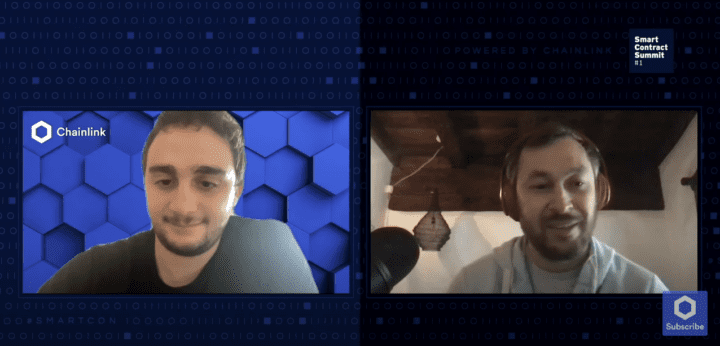High-performance, low-cost blockchain network Solana announced in August that Chainlink Price Feeds went live on the Solana Devnet, with mainnet integration on the way in Q4. Now in the home stretch of the integration’s expected timeline, developers are eager to build high-speed, low-cost DeFi applications with even greater efficiency using Chainlink’s industry-standard oracles for sub-second, tamper-resistant, high-quality off-chain data.
How will these applications tip the scale toward DeFi’s mass adoption? In an elucidating fireside chat at this year’s SmartCon, Anatoly Yakovenko, CEO of Solana Labs, the architect of Solana protocol, and Chainlink Labs’ Head of Integration, Johann Eid, shared how they expect Chainlink’s decentralized oracle infrastructure and Solana’s unique blockchain architecture to catalyze a new tier of advanced high-throughput DeFi applications that shift mainstream adoption into a pivotal new gear.
Creating Network Effects
“The key thing with any platform is – can an engineer self-serve?,” said Yakovenko. “For that to be possible, you need network effects; you just need enough stuff out there.” In his view, the ability to write smart contracts in Rust on Solana is freeing developers to build off of each other. “What I’ve seen from the outside is that it’s basically setting a standard,” Eid agreed. “You’re not siloed in your own ecosystem when you code in Rust.”
Yakovenko said he sees developers building on Solana using a package management system, where one package is commonly used by a number of developers across a host of smart contracts. “Now that allows the whole ecosystem to leverage and allows the next developer to self-serve and figure it out, because they can Google for it and figure out what dependencies they need and move forward,” he explained. “Those kinds of network effects are really powerful when they work right.”
Attracting Next-Gen Developers
“We’ve gotten insane demand from hundreds of applications; lots of people are building on top of Solana – synthetics platforms, futures platforms, DEXs, lending – basically any DeFi use case you can think of is building on top,” Eid said. “They want super-high frequency; they want super-low fees, nonexistent fees most of the time.”
“I’m really excited about the number of developers that quit their cushy jobs at Google and decided to go eat glass and be a CEO of a startup and really grind out product-market fit and build something new and unique,” Yakovenko said. In his view, the most important factor driving DeFi’s mass adoption is how many next-generation brains start building decentralized applications that create end value for millions of users.
Lifting Critical Barriers
Yakovenko explained the difference between building smart contract applications now and a few years ago is that now founders can take a product to market in a matter of weeks over the span of a single hackathon. “The only time I remember this is being a teenager and seeing that happen on the internet in the 90s,” he said. “This is a once-in-a-generation type of event.”
Eid agreed that platforms like Chainlink and Solana are giving developers tools that serve as the foundation for increasingly sophisticated use cases. “There is too much stuff to learn for one group to do it all,” he said. “We’re providing these tools so that these pioneers can go and set the frontiers of innovation further and further.”
Solana’s low fees are key to this type of expansion. “We need these networks to be able to handle a billion users for the developers that are the founders coming into the space to imagine that being possible,” Yakovenko said. “They need to feel like they can do it and not worry about scaling or costs and really take a big shot at a big use case.”
“Once we see these barriers lifted, innovation just grows super-quick,” Eid agreed. “We’re really looking forward to being on Solana in Q4 and to start doing all of this together.”
“I think the best version of Chainlink is going to be on Solana,” Yakovenko said. “I’m really excited for that to happen.”
To learn more about Solana, visit their website, Twitter, Discord and GitHub.
Watch the full SmartCon fireside chat between Anatoly Yakovenko and Johann Eid.
Explore other presentations from Smart Contract Summit #1’s playlist.


